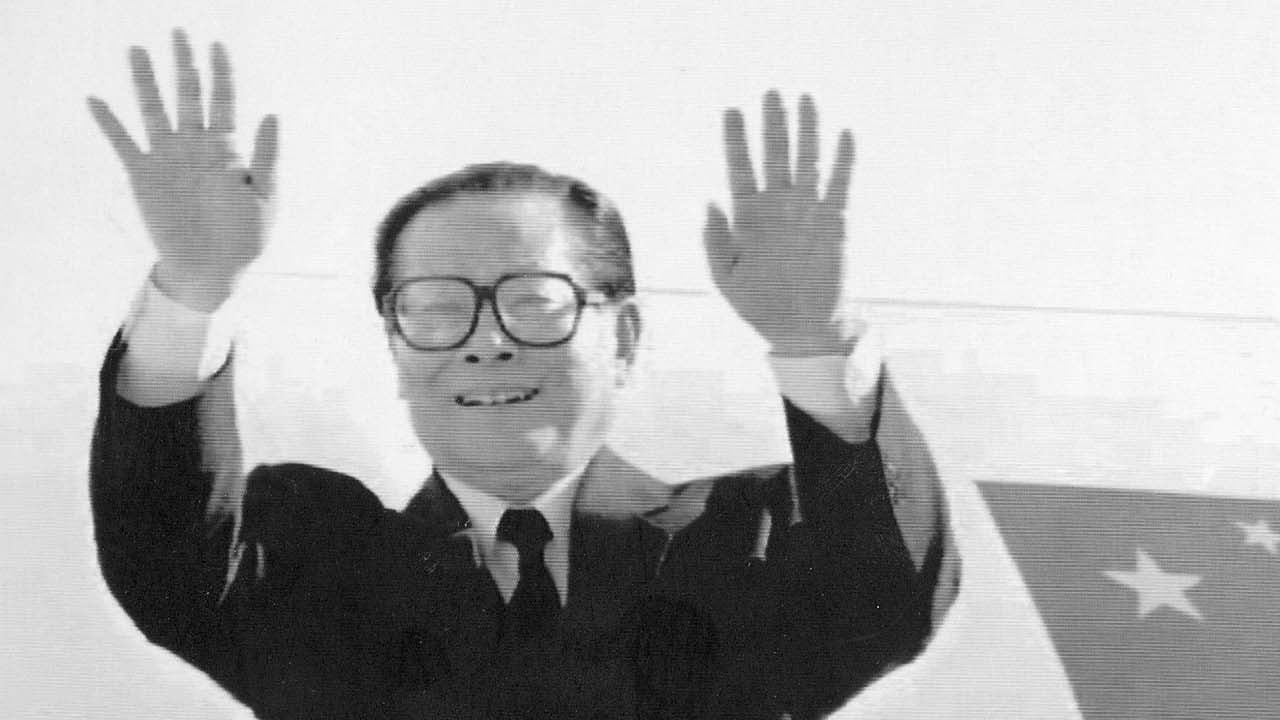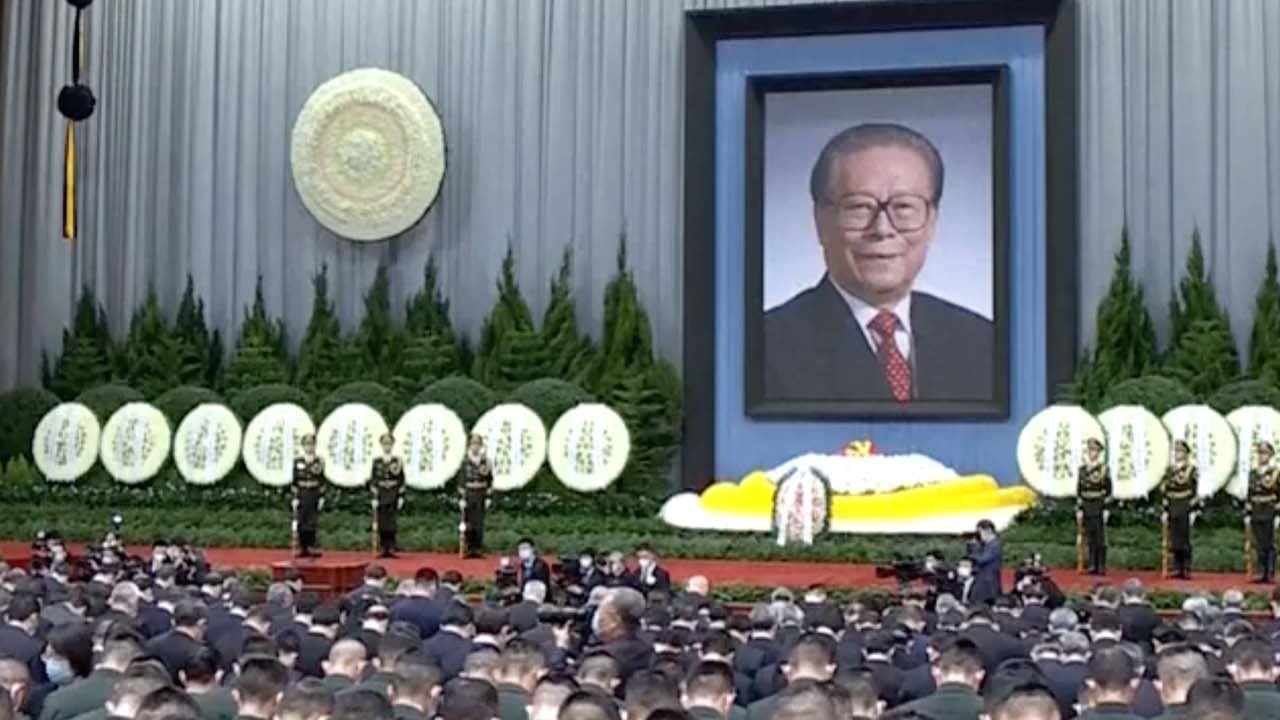
Global Impact: Xi Jinping urges China to ‘write a new chapter of socialism with Chinese characteristics’ after Jiang Zemin’s death
- Global Impact is a fortnightly curated newsletter featuring a news topic originating in China with a significant macro impact for our newsreaders around the world
- In this edition, we look back at the life and achievements of former Chinese president Jiang Zemin, and ahead to what the future holds for China
President Xi Jinping heaped praise on his predecessor for his statesmanship, upholding socialism and defending the Communist cause, while also pressing ahead with reform and opening up in the aftermath of Beijing’s crackdown on a pro-democracy movement.
“Comrade Jiang Zemin, who is sincerely loved by the whole party, the army and the people of all ethnicities, will live forever,” Xi said in his eulogy at the funeral attended by thousands at the Great Hall of the People.
The former president not only helped China break through western sanctions in the 1990s, but he also reshaped the Communist Party with his “Three Represents” theory in embracing private entrepreneurs as party members.
Jiang’s death signifies that the era of “old-man politics” in China had ended, as the influence of party elders like him dwindled after they stepped down from their official positions.
In his eulogy for Jiang, Xi, who now enjoys unrivalled power in the leadership, called on the country to rally around himself and to “inherit the will of comrade Jiang Zemin … and to write a new chapter of socialism with Chinese characteristics”.
As evident from Jiang’s state funeral, few will confuse who is writing the next chapter of Chinese politics.
60 second catch-up
Deep Dives

‘Dig into tough problems’: scientists remember Jiang Zemin for his intellectual curiosity
-
Former president had a keen appreciation of science, ‘thirst to explore new ideas’
-
Jiang sometimes even phoned researchers directly with tough questions
Former Chinese president Jiang Zemin has been remembered for his lifelong intellectual curiosity and keen appreciation of science. Jiang died last week at the age of 96.

China’s economic rise under Jiang Zemin featured lessons, warnings that still resonate today
-
When China was at a critical crossroads in 1989, Jiang helped solidify the groundwork for a socialist market economy via market reforms and international trade
-
But the economic awakening was not without its pitfalls, as corruption was widespread in the 1990s and China’s wealth divide turned into a vast chasm
China’s embrace of change in critical times – with bold economic reform and the pursuit of favourable external ties – was seen as a hallmark of Jiang Zemin’s 13-year leadership.
And such proactive pursuits serve as a lesson that many analysts today believe could help the country weather a variety of storms and looming headwinds.

China, US and the Jiang Zemin reset: how former Cold War rivals found a decade of unsteady calm after Tiananmen
-
Jiang Zemin and Bill Clinton met in Seattle in 1993, when an ostracised China was ‘in great difficulties’ following the Tiananmen crackdown
-
So began Jiang’s eventful steering of bilateral ties, the high points of which were China’s entry to the WTO and hosting of the 2008 Olympics
China was “in great difficulties” back then, hit by US-led sanctions and diplomatic isolation following the events of June 1989, former foreign minister Li Zhaoxing recalled later.

Shanghai remembers Jiang Zemin as ‘key architect’ of growth and reform
-
Residents remember the former president who died on Wednesday as an influential leader that put the city firmly on the path towards economic reform
-
Jiang graduated from Shanghai Jiao Tong University in 1947, earning a degree in electrical engineering. He had joined the Communist Party while studying there

Jiang Zemin: leader who counted Hong Kong’s return to Chinese rule as one of his proudest achievements
-
Jiang Zemin promised Beijing would unswervingly implement the principles of ‘one country, two systems’ and ‘Hong Kong people administering Hong Kong’
-
Past and present Hong Kong chief executives pay tribute to ‘outstanding leader’
Jiang, the first Chinese head of state to visit Hong Kong, flew in on the afternoon of June 30 along with then premier Li Peng, Zuo Lin, widow of the late paramount leader Deng Xiaoping, architect of the “one country, two systems” governing principle, and other officials to mark the end of 156 years of British colonial rule.

Jiang Zemin: the president who took China from Tiananmen pariah to rising power
-
Jiang is hailed for mending ties with the West, the handover of Hong Kong, modernising the Communist Party at home and a successful bid to host Olympics
-
In a country led by inscrutable politicians, charismatic ‘Uncle Toad’ came to be admired for his distinctive appearance and idiosyncratic diplomacy
Global Impact is a fortnightly curated newsletter featuring a news topic originating in China with a significant macro impact for our newsreaders around the world.


